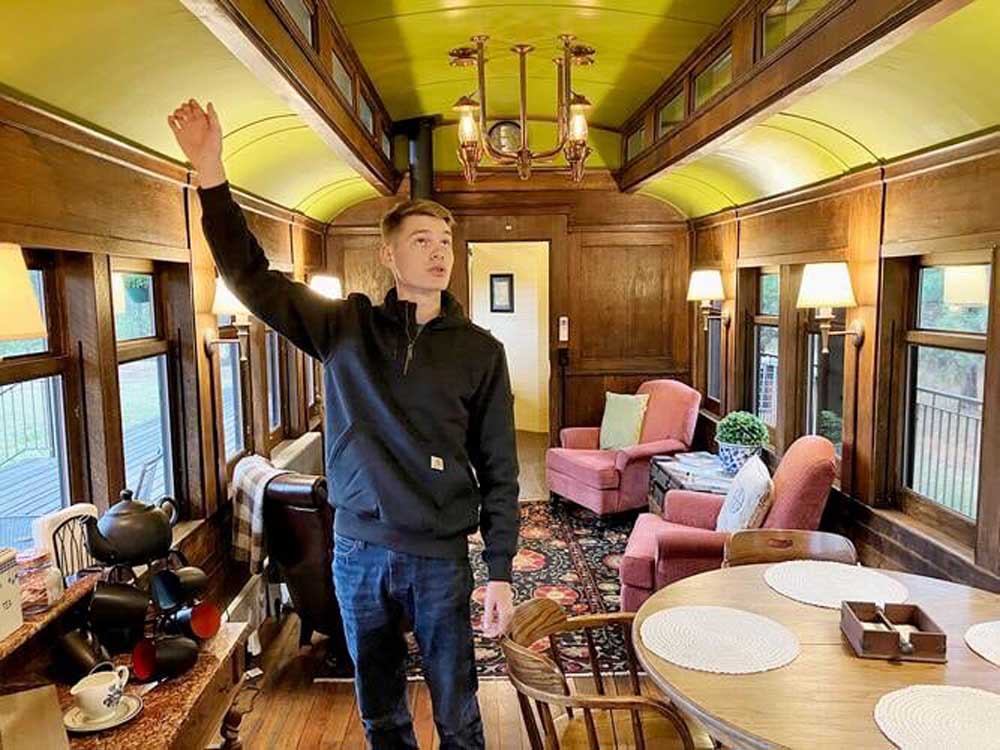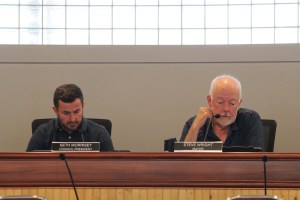Railcar abandoned on Idaho farm now a destination stay
Published 12:53 pm Thursday, January 9, 2025

- Property manager David French shows off the interior of the restored train car near Deary, Idaho.
DEARY, Idaho — Loyal Fleener was worried about his barn collapsing because of snow piling up on the roof.
Trending
The longtime Deary wheat and barley farmer went into Edward “Webb” French’s family’s bakery, the Pie Safe Bakery and Kitchen, every day.
Fleener asked French if he would come clean off the snow.
So French went out to Fleener’s farm.
Trending
“Got over there — there was a train car sitting in his barn,” French recalled. “Very interesting, obviously. Wasn’t expecting that. So I asked him about it.”
It was Washington, Idaho and Montana Railway Car 306, a passenger, mail and cargo combination railcar, built in 1906 and decommissioned in the 1950s, according to French’s son, Isaac, in an August thread on X.
“It was a rotting, cat-infested wreck,” Isaac French wrote. “But after investing $147,000 and five months of work, we redeemed it.”
French’s family restored the old railcar and now rents it on Airbnb.
“Today, it’s one of the most profitable and exclusive stays in the country,” Isaac French said.
The previous owner of the land had purchased the train car at a surplus sale, Webb French said.
“(He) had been feeding cows out of it for years,” Webb French said.
When Fleener bought the property, the railcar was sitting in a field. He put logs under it and dragged it up near his house with a piece of Caterpillar equipment, then built a barn over it to preserve it.
“He made it into kind of a crew quarter there for a while, so his hired hands could live in it — there was evidence of that,” Webb French said.
Fleener installed wiring and would stay in it during the week while logging or farming, instead of making the 50-mile round trip between Deary and Moscow, where he lived.
The railcar sat in Fleener’s barn for about 45 years, Webb French estimated.
‘Cat house’
The train car mostly served as a “catch-all” of sorts for junk.
“It was a cat house for 20 years,” Fleener said. “There were probably anywhere from five to 15 cats in there from time to time. It was part of a chicken house for a while.”
“Approximately 20 cats had made it their home, and the smell was almost unbearable,” Isaac French said on X.
But Webb French’s face lit up when he saw the railcar.
“I mentioned to him, ‘If you ever want to sell this, I’d sure be interested in restoring it,’” Webb French said.
Fleener asked him to make an offer. Webb French did, for $2,000, according to Isaac French’s thread on X, and the two men agreed.
Webb French has a total of 10 children, eight boys and two girls.
Two brothers live out of state, the rest are involved in the construction business, Quality Contractors LLC, where Webb French is owner and partner.
One brother has the bakery, which is in a former Ford garage, now refurbished. Webb French owns the building.
“Lots of labor available,” said David French, who manages the family’s train-related properties.
Webb French is the big train buff, David French said.
Webb French and his family maintain a small herd of about 40 cattle, six sheep and farm ground where they cut grass hay.
“The construction pays for all the things we enjoy doing, and we enjoy the construction, too,” Webb French said.
Like the garage-turned-bakery, they’ve restored other older buildings.
“Historical preservation is something I personally really enjoy doing,” Webb French said.
But there are limits, he noted.
“If something has fallen in, I don’t think you should preserve it,” he said.
Several sons are skillful at carpentry and other restoration requirements.
“I don’t really have those kinds of skills — it takes all of us working together to restore these things,” Webb French said.
He uses the old garage and bakery as an example. They probably could have knocked it down and put up a metal structure for less than what they put into restoration.
“But there’s an extreme amount of character in these things,” he said. “When you factor in the amount of character in the building and the appreciation people have, there’s a whole lot said that isn’t even on paper.”
He praised Fleener for covering the railcar with the barn.
“We wouldn’t even have a train car to work on if he hadn’t done that,” Webb French said. “It had begun to rot out in the field.”
Moving the railcar
Webb French spent several years trying to find someone who could move the railcar off Fleener’s property.
In the meantime, Fleener found a safe place to move the cats, Webb French added.
The family toyed with moving it themselves, but “we realized we were biting off more than we could chew,” he said.
The whole process took about three to four years after the first time Webb French saw it, he said.
Around Christmas 2019, they finally pulled the railcar out of the barn, relocating it about 3 to 4 miles from Webb French’s home a month later.
“’course, that was quite an ordeal,” Fleener said of moving the railcar.
“Now the tricky part: How to move a 61-foot train car down winding, hilly, backcountry roads?” Isaac French wrote. “The wood was almost completely rotten, and the ground was slick with mud and snow. Two months later, for $10,000 a local trucker hooked it up and towed the car to the hill my dad dreamed it would sit.”
“And I began to think, ‘Now, when I get there, what do I do with this thing?’” Webb French said.
Folks suggested a museum or walk-through area, but then the family would need to rely on donations to keep the train preserved, David French said.
Funding and operating a restored train car wouldn’t necessarily have been feasible for such a small operation, Webb French said.
“Somewhere in there, I had the idea it would make a really neat accommodation,” he said. “And that could then pay for it, too, if it was done right.”









